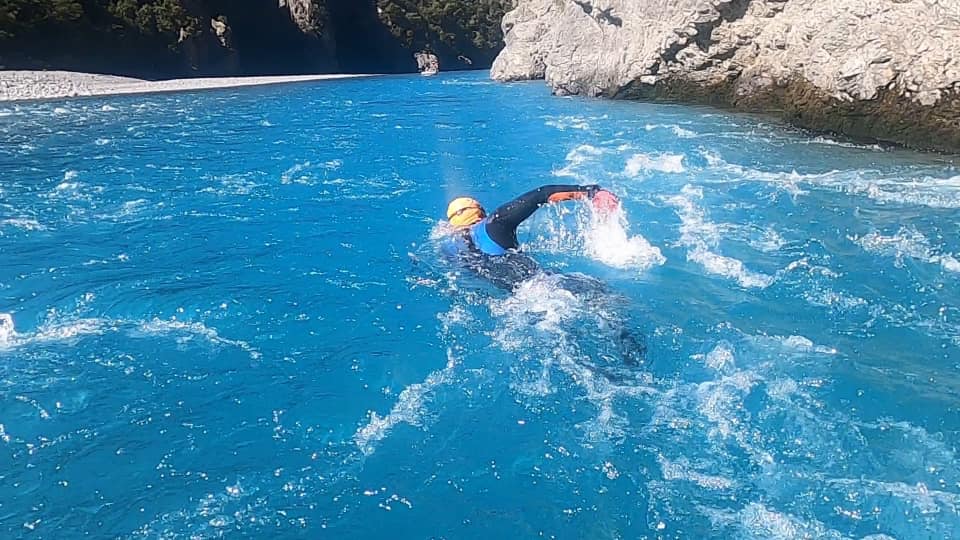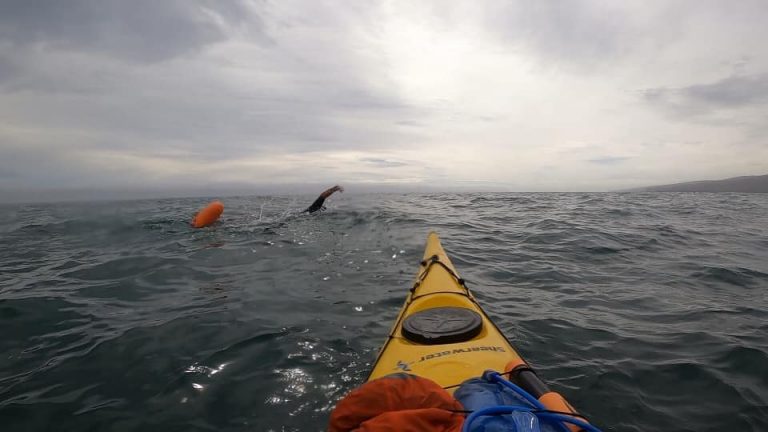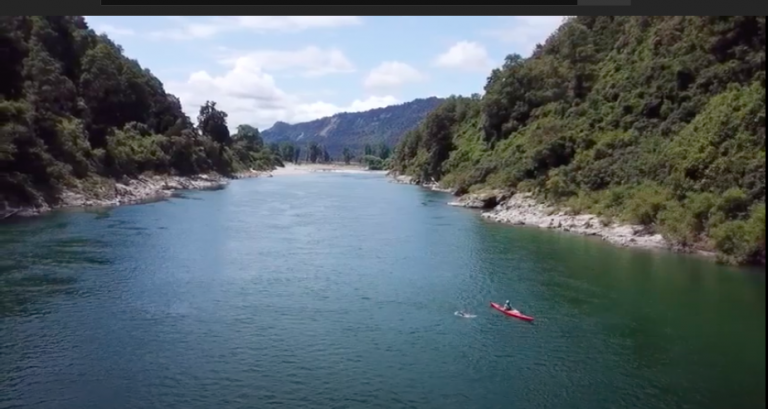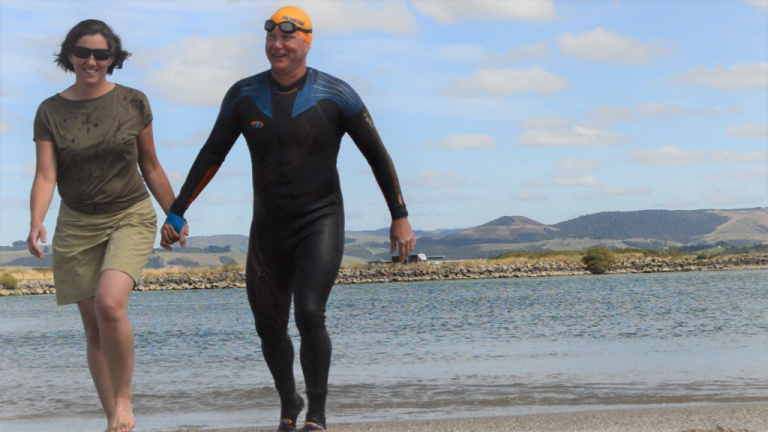Making the turn towards the town of Murchinson, the Buller River came into view for the first time in about nine months. The previous April, I’d just finished mountain biking the Old Ghost Road, which is appropriately billed as New Zealand’s wildest ride. At 85 km in the backcountry, over and around mountains, it lived up to its reputation. After completing that ride, I stared down the Buller River for the first time on a shuttle back to my car. As is my unusual habit, I tend to see things through the lens of an adventure swimmer. Taking in its beauty, I noted that the river looked deep enough to swim and considered whether I could realistically sprint around the bends with the rapids without getting slammed into a rock wall.
Now, nine months later, I was back, ready to swim. Upon returning home from my mountain bike trip, I’d immediately called Ultimate Descents, a kayak tour company that operates on the Buller. I asked about going on one of their kayak river tours and being guided down the river, except I didn’t want to be in a kayak. “Uhh….. suuuuure….” was the initial response. The person on the phone had likely recognised my foreign accent and thought, “this is the dumbest tourist request I’ve ever heard.”
Eventually convincing them that I was indeed an adventure swimmer and not an idiot—well, maybe I am an idiot; there’s certainly a case to be made—I was now staring down the Buller again, knowing that I’d be swimming in it the next day. Pulling over next to a set of surging rapids, I felt the anxiety bubble up inside me. “Shit just got real,”I thought. “Maybe there’s a reason why nobody has ever looked at this river and thought about going for a marathon swim.”
It took a yoga session and thinking back to my years of experience in endurance sport to get my head right about what lay ahead the next day.
Not an Isolated set of Jitters
I felt the same anxiety about a year and a half later when powering up the remote Waimakariri Gorge in a jet boat. A 35 km wild and winding river that, again, nobody had ever thought to swim. The Waimakariri—or Waimak as it’s often referred to—is the kayak leg of New Zealand’s legendary multi-sport Coast-to-Coast race. As I was taking in the sharp turns going up the river, with my support kayaker sitting next to me, his kayak strapped to the jet boat, my heart was somehow both pounding in my chest and leaping out of my throat.
“Only an idiot would think this is a good idea,”I thought. But this was my fourth time trying to swim the Waimak. The previous three attempts had to be aborted. One because of unusually low water flow, with the river too shallow to swim. Two previous attempts were aborted because of flood conditions. And then, on that jet boat, I had the thought, “this is even crazier than Devil’s Nook on the Clutha River and the wildest rapids the Buller River. Can I really pull this off? I’m not an elite level athlete. I’m a 46 year old chiropractor with weird ideas about what ‘fun’ means.” That seems to be true. I have odd ideas about how to spend my weekends, holiday time. And I often have a mental freakout just before starting an expedition, particularly a river swim. But oddly, once I get started, I find my flow state where everything in my mind melts away. Even in the rapids, where few swimmers ever venture, I feel no fear or worry. I’m at home in the rough water.
I am not challenged by any form of anxiety disorder, and I rarely feel anxious in day to day actions. However, I experience pre-event nerves in almost all the challenges I take on, even though I began training as a triathlete in 1989. I’ve done everything from a sprint triathlon to Ironman many times over. I’ve run across deserts, trekked in the middle of nowhere, cycle toured around different countries from Italy to Thailand, Sri Lanka to Australia and New Zealand. I’ve swum the Mighty Clutha—the only one to do so. I’ve swum the 26 km Lake Tekapo, the 16 km frigidly cold Lake Coleridge, the 14 km Akaroa Harbour, and I am planning another unprecedented swim around the perimeter of the Banks Peninsula, an 80 km ocean swim over three days. And yet, I still feel like I’m in over my head at the start line of a triathlon or multi-day adventure. Generally speaking, I’m almost always able to get my thoughts on the task at hand within several minutes of spinning my arms, cranking the pedals or putting one foot in front of the other.
Pre-Event Nerves not Limited to Events
In the last 18 months, I took on another kind of challenge that I’ve always wanted to do. Unlike most of the challenges that I’ve voluntarily lined up for, this one didn’t involve pushing the limits of my physical endurance. Despite always having pre-event nerves—worried that I might not be up to the challenge, or when on an expedition of some kind as is usually the case these days, I worry that I’ve forgotten some essential part of the plan. I do have a penchant for getting myself into some mishaps. Usually, they are comedic in retrospect. Often, they can be scary in the moment. From a fiasco in the Montreal airport after the Canadian National Triathlon Championships, the world’s worst post-Ironman plan, accidentally offending the Gods out in the middle-of-nowhere in Mongolia, and even losing a fight to a turtle in a marathon swim, I’ve spectacularly earned the right to have some self-doubt in my endurance endeavours.
Writing a book was a different beast. I guess you could say it was ‘my pandemic project’ since I started it on the second day of the initial New Zealand lockdown in March 2020. I’ve always wanted to write a book. There were various reasons why I didn’t beforehand. First, I thought, “I’m neither elite nor famous. Who’d read a book about my adventures?” Another was, “I’ll get around to doing that when I have more time.” Being a busy chiropractor and always dreaming of another race or expedition, more time never seemed to materialise. However, scarcely a month after reaching the Pacific, 4.5 days after jumping in the Clutha River at the Outlet in Lake Wanaka, the Covid-19 lockdown was imposed I had the time to make a start at my book and what I thought would make the perfect conclusion.
As I wrote about my adventures and challenges, recounting my first triathlon when I was smashing into the marker buoys on the swim or tripping over my feet, to confronting my insecurities as an untalented athlete at age 17, while simultaneously fighting off my alcoholic father just days before one of my best ever triathlons, all the way to the Clutha River nearly 30 years later, I began to feel anxious. “Who is going to read this?” I wondered, often in my head, often to my wife, who was in the middle of writing her own book. I confronted that self-doubt by asking myself the question, “If I know for a fact that I will not make money by writing this book, is this something I really want to do anyway?” The answer turned out to be, “yes!”
The ‘flow’ phase of writing was enjoyable. I had been a creative little kid. When not running around in the mud or splashing about in the water, I was either drawing or writing short stories. At some point in adulthood, I realised that I’d lost track of that creative side of myself. I already know that if I only sell seven books to people other than my mother, I will continue to write.
However, the editing was another beast. During the structural edit phase, where I cut out over half of what I’d written with the help of my wife, I learned that every detail of every adventure was not necessary to get across the story. However, it was a process that made me feel either anxious or annoyed until I came to see her way of seeing my story from an outsiders perspective.
When I began publishing my book, after going through the process of self-editing, then using the Grammarly program, repeating those steps a dozen times, and then sending it to my editor, I was anxious. Oddly, it felt exactly the same—and sometimes moreso—as if I were on the start line of a triathlon or staring downriver before going for a marathon swim where nobody else had ever done so.
When I finally uploaded my book onto online book retailers, feeling proud of my accomplishment wasn’t my initial thought. In the moments before the submit button was clicked, I felt a combination of heart flutters and wobbly legs. I’m used to dealing with nerves by pushing my absolute endurance limits. It’s more primal. When confronted with a fight-or-flight stress response, swimming, cycling, or running is a physiologically natural thing to do. But I found that I had a harder time settling my thoughts when I was about to click a button on a computer screen—not having a body of water to cross or a trail to run. I did go out for a run later that day, but I had to rest for a while beforehand because my legs felt weak.
When I got the first proof copy of my book in the mail two weeks later, I was first thrilled that nothing silly had happened like the cover being printed upside down. I loved the font size, and so far, I’ve only found one minor spelling error and a missing comma. Perhaps most readers will forgive that. I recently read a new book by one of my favourite authors and found three spelling mistakes. I probably would never have even noticed that before attempting to write my own book. So after a set of pushups, followed by a run, the mental beatdown I gave myself after spotting an extra ‘s’ on the end of a word that should not be plural was countered by the calmness that running instils in me.
My book, Downriver Nomad, has been available for pre-order for a few weeks and will finally be released on Monday, October 11th. It’s been heartwarming to receive messages and comments from a lot of people to say they’re looking forward to reading it. Looking over my first copy, I’ve seen a few things that I would have said slightly differently if I’d had to do it again. I’ve thought about people getting upset about something I’ve said. In the age of internet comments and online reviews, a bad review or comment can ruin a day. Generally speaking, I have thick skin. I brush off most negative comments, and I don’t even look at social media for anything beyond swimming, cycling, running or funny jokes. And I never read internet comments anymore on posts or articles about social or political issues. I’ve long since stopped seeing the point in that. But … I’ve never released a book before. And although I am excited to hear if people enjoy it, nervousness is there too.
Being Confident While Being Human
While I don’t struggle with any anxiety disorder, and I could never claim to relate to anyone who does, I think I suffer from that thing called “being human.” I think I have high self-confidence. I was happy to attempt a triathlon when I could barely run without tripping at age 13. I was happy to move countries four times. I lined up for my first Ironman, having never run a marathon before. I have swum six bodies of water that nobody else has. I was excited to release a book. But having self-confidence doesn’t mean being free of doubt or anxiety.
When I was younger, I used to be inspired by quotes like, “have no fear” or “I am unbreakable.” Perhaps some common sense has come with not being 21 anymore. I still train as hard as I did when I was that age. But I’ve since recognised that anyone claiming to have no fear or declaring themselves unbreakable are likely just beating their chest, trying to convince themselves and others of that lie. Because I don’t think anyone has no fear and nobody is unbreakable. I’ve also recognised that not every endurance challenge has to leave your legs or shoulders sore for days on end. Swimming the Clutha was tough, and writing a book that ended with the Clutha River Swim challenged me in ways I never thought possible.
My book, Downriver Nomad, is available on most online book retailers and will be released on October 11th, 2021.



